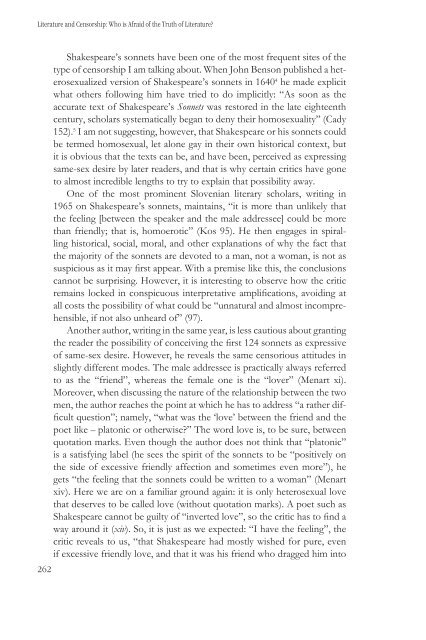Literatura in cenzura - Društvo za primerjalno književnost - ZRC SAZU
Literatura in cenzura - Društvo za primerjalno književnost - ZRC SAZU
Literatura in cenzura - Društvo za primerjalno književnost - ZRC SAZU
- No tags were found...
You also want an ePaper? Increase the reach of your titles
YUMPU automatically turns print PDFs into web optimized ePapers that Google loves.
Literature and Censorship: Who is Afraid of the Truth of Literature?262Shakespeare’s sonnets have been one of the most frequent sites of thetype of censorship I am talk<strong>in</strong>g about. When John Benson published a heterosexualizedversion of Shakespeare’s sonnets <strong>in</strong> 1640 4 he made explicitwhat others follow<strong>in</strong>g him have tried to do implicitly: “As soon as theaccurate text of Shakespeare’s Sonnets was restored <strong>in</strong> the late eighteenthcentury, scholars systematically began to deny their homosexuality” (Cady152). 5 I am not suggest<strong>in</strong>g, however, that Shakespeare or his sonnets couldbe termed homosexual, let alone gay <strong>in</strong> their own historical context, butit is obvious that the texts can be, and have been, perceived as express<strong>in</strong>gsame-sex desire by later readers, and that is why certa<strong>in</strong> critics have goneto almost <strong>in</strong>credible lengths to try to expla<strong>in</strong> that possibility away.One of the most prom<strong>in</strong>ent Slovenian literary scholars, writ<strong>in</strong>g <strong>in</strong>1965 on Shakespeare’s sonnets, ma<strong>in</strong>ta<strong>in</strong>s, “it is more than unlikely thatthe feel<strong>in</strong>g [between the speaker and the male addressee] could be morethan friendly; that is, homoerotic” (Kos 95). He then engages <strong>in</strong> spirall<strong>in</strong>ghistorical, social, moral, and other explanations of why the fact thatthe majority of the sonnets are devoted to a man, not a woman, is not assuspicious as it may first appear. With a premise like this, the conclusionscannot be surpris<strong>in</strong>g. However, it is <strong>in</strong>terest<strong>in</strong>g to observe how the criticrema<strong>in</strong>s locked <strong>in</strong> conspicuous <strong>in</strong>terpretative amplifications, avoid<strong>in</strong>g atall costs the possibility of what could be “unnatural and almost <strong>in</strong>comprehensible,if not also unheard of” (97).Another author, writ<strong>in</strong>g <strong>in</strong> the same year, is less cautious about grant<strong>in</strong>gthe reader the possibility of conceiv<strong>in</strong>g the first 124 sonnets as expressiveof same-sex desire. However, he reveals the same censorious attitudes <strong>in</strong>slightly different modes. The male addressee is practically always referredto as the “friend”, whereas the female one is the “lover” (Menart xi).Moreover, when discuss<strong>in</strong>g the nature of the relationship between the twomen, the author reaches the po<strong>in</strong>t at which he has to address “a rather difficultquestion”; namely, “what was the ‘love’ between the friend and thepoet like – platonic or otherwise?” The word love is, to be sure, betweenquotation marks. Even though the author does not th<strong>in</strong>k that “platonic”is a satisfy<strong>in</strong>g label (he sees the spirit of the sonnets to be “positively onthe side of excessive friendly affection and sometimes even more”), hegets “the feel<strong>in</strong>g that the sonnets could be written to a woman” (Menartxiv). Here we are on a familiar ground aga<strong>in</strong>: it is only heterosexual lovethat deserves to be called love (without quotation marks). A poet such asShakespeare cannot be guilty of “<strong>in</strong>verted love”, so the critic has to f<strong>in</strong>d away around it (xiv). So, it is just as we expected: “I have the feel<strong>in</strong>g”, thecritic reveals to us, “that Shakespeare had mostly wished for pure, evenif excessive friendly love, and that it was his friend who dragged him <strong>in</strong>to
















